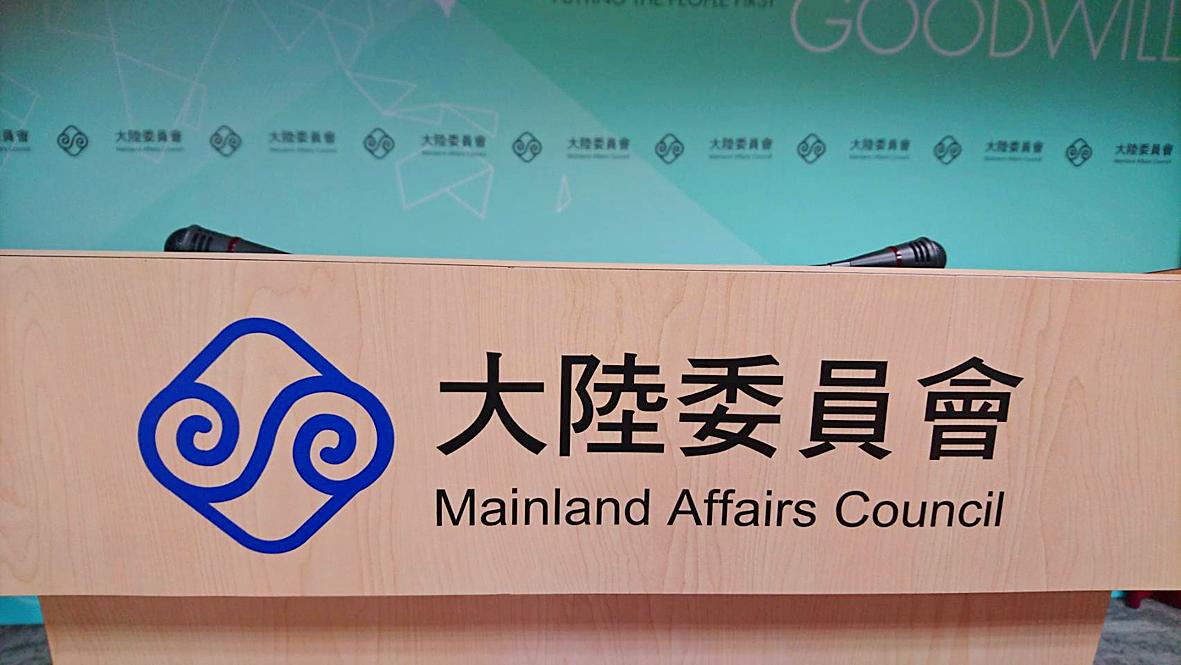A plan to increase fines for Taiwanese who work for political organizations in China advanced at the legislature in Taipei yesterday, when a draft amendment to the Act Governing Relations Between the People of the Taiwan Area and the Mainland Area (台灣地區與大陸地區人民關係條例) passed its first reading.
The draft was proposed by Democratic Progressive Party (DPP) Legislator Michelle Lin (林楚茵) after Chang Ching-yi (張經義) — a Taiwanese reporter who works for a Chinese state-run agency — on April 9 did not tell a White House news conference about his company, instead saying: “I am from Taiwan” during his question time with US President Donald Trump.
Chang is a Taiwanese-born employee at Shanghai Media Group (上海文化廣播影視集團), a state-owned mouthpiece of the Chinese Communist Party (CCP).

Photo: Chung Li-hua, Taipei Times
Mainland Affairs Council (MAC) Deputy Minister Chiu Chui-cheng (邱垂正) on Thursday said Chang broke the law and could be fined between NT$100,000 and NT$500,000 (US$3,322 and US$16,610).
Article 33 of the act states that “any individual, juristic person, organization, or other institution of the Taiwan Area shall not hold any position or become any member of the agencies, institutions or organizations of the Mainland Area which are political parties, the military, the administration or of any political nature and which are prohibited with public notices by the Mainland Affairs Council, Executive Yuan in consultation with each competent authorities concerned.”
The amendment would boost the maximum fine to NT$1 million.
China has used multiple means to “buy off” Taiwanese, having them hired at Chinese organizations and agencies of a political nature, Lin said yesterday, adding that a maximum fine of NT$500,000 was too small to be a deterrent.
Separately yesterday, Chinese Nationalist Party (KMT) Legislator Yeh Yu-lan (葉毓蘭) protested the decision to pass the amendment, saying that all Chinese media firms have state-ownership backgrounds, so the change to the law would in effect be a ban on Taiwanese working for any Chinese media firm.
It is a restriction of people’s right to work, an extremely unwise move in Taiwan, which advocates freedom of speech, Yeh said.
KMT Legislator Hung Meng-kai (洪孟楷) called on the DPP government not to oppose everything China-related.
Chang, who grew up in Yunlin County and has the chance to ask the US president questions, should be applauded, Hung said.

DAREDEVIL: Honnold said it had always been a dream of his to climb Taipei 101, while a Netflix producer said the skyscraper was ‘a real icon of this country’ US climber Alex Honnold yesterday took on Taiwan’s tallest building, becoming the first person to scale Taipei 101 without a rope, harness or safety net. Hundreds of spectators gathered at the base of the 101-story skyscraper to watch Honnold, 40, embark on his daredevil feat, which was also broadcast live on Netflix. Dressed in a red T-shirt and yellow custom-made climbing shoes, Honnold swiftly moved up the southeast face of the glass and steel building. At one point, he stepped onto a platform midway up to wave down at fans and onlookers who were taking photos. People watching from inside

A Vietnamese migrant worker yesterday won NT$12 million (US$379,627) on a Lunar New Year scratch card in Kaohsiung as part of Taiwan Lottery Co’s (台灣彩券) “NT$12 Million Grand Fortune” (1200萬大吉利) game. The man was the first top-prize winner of the new game launched on Jan. 6 to mark the Lunar New Year. Three Vietnamese migrant workers visited a Taiwan Lottery shop on Xinyue Street in Kaohsiung’s Gangshan District (崗山), a store representative said. The player bought multiple tickets and, after winning nothing, held the final lottery ticket in one hand and rubbed the store’s statue of the Maitreya Buddha’s belly with the other,

‘NATO-PLUS’: ‘Our strategic partners in the Indo-Pacific are facing increasing aggression by the Chinese Communist Party,’ US Representative Rob Wittman said The US House of Representatives on Monday released its version of the Consolidated Appropriations Act, which includes US$1.15 billion to support security cooperation with Taiwan. The omnibus act, covering US$1.2 trillion of spending, allocates US$1 billion for the Taiwan Security Cooperation Initiative, as well as US$150 million for the replacement of defense articles and reimbursement of defense services provided to Taiwan. The fund allocations were based on the US National Defense Authorization Act for fiscal 2026 that was passed by the US Congress last month and authorized up to US$1 billion to the US Defense Security Cooperation Agency in support of the

‘COMMITTED TO DETERRENCE’: Washington would stand by its allies, but it can only help as much as countries help themselves, Raymond Greene said The US is committed to deterrence in the first island chain, but it should not bear the burden alone, as “freedom is not free,” American Institute in Taiwan Director Raymond Greene said in a speech at the Institute for National Defense and Security Research’s “Strengthening Resilience: Defense as the Engine of Development” seminar in Taipei yesterday. In the speech, titled “Investing Together and a Secure and Prosperous Future,” Greene highlighted the contributions of US President Donald Trump’s administration to Taiwan’s defense efforts, including the establishment of supply chains for drones and autonomous systems, offers of security assistance and the expansion of